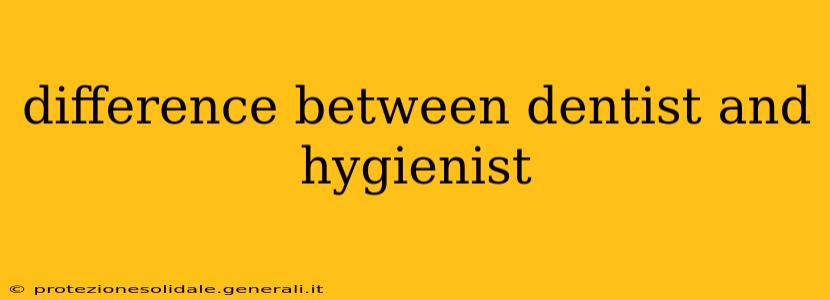Choosing the right oral healthcare professional is crucial for maintaining healthy teeth and gums. But what's the difference between a dentist and a dental hygienist? While both play vital roles in your oral health, their training, responsibilities, and scope of practice differ significantly. This article will clarify the distinctions, answering common questions many people have about these two essential members of your dental healthcare team.
What Does a Dentist Do?
Dentists are medical professionals who have completed extensive education and training, earning a Doctor of Dental Surgery (DDS) or Doctor of Dental Medicine (DMD) degree. They are responsible for the overall diagnosis, prevention, and treatment of oral diseases and conditions. A dentist's responsibilities include:
- Diagnosing and treating oral diseases: This includes identifying and managing conditions like cavities, gum disease (gingivitis and periodontitis), oral cancer, and temporomandibular joint (TMJ) disorders.
- Performing dental procedures: Dentists carry out procedures such as fillings, extractions, root canals, crowns, bridges, dentures, implants, and orthodontics (braces).
- Developing and implementing treatment plans: Based on a thorough examination and diagnosis, dentists create personalized treatment plans to address individual needs.
- Providing preventative care: While hygienists play a major role here, dentists also educate patients on proper oral hygiene practices, diet, and other preventative measures.
- Referring patients to specialists: When necessary, dentists refer patients to specialists like oral surgeons, periodontists, or endodontists for specialized treatment.
What Does a Dental Hygienist Do?
Dental hygienists are licensed healthcare professionals who work closely with dentists to provide preventative oral care. Their focus is on maintaining the health of gums and teeth through cleaning and education. A hygienist's key duties include:
- Performing professional teeth cleanings: This involves removing plaque and tartar buildup from teeth and gums, improving overall oral hygiene.
- Providing oral health education: Hygienists instruct patients on proper brushing and flossing techniques, healthy dietary choices, and other habits to maintain optimal oral health.
- Taking and charting X-rays: While dentists interpret the X-rays, hygienists often take and develop the initial images.
- Applying fluoride treatments: This helps strengthen tooth enamel and prevent cavities.
- Assessing gum health: Hygienists monitor the health of gums, looking for signs of gingivitis or periodontitis and reporting findings to the dentist.
What are the Educational Requirements?
The significant difference in their roles reflects their distinct educational pathways. Dentists undergo extensive training, typically completing four years of dental school after earning a bachelor's degree. This rigorous curriculum involves extensive coursework, hands-on clinical experience, and rigorous examinations. Dental hygienists, on the other hand, typically complete an associate's or bachelor's degree program in dental hygiene, which includes both classroom learning and clinical practice.
Who Should You See for What?
Generally speaking:
- See a dentist for: Diagnoses, treatment plans for cavities, gum disease, oral surgery, and any significant oral health issues. They are also the point person for creating a comprehensive plan for your overall oral health.
- See a dental hygienist for: Regular cleanings, professional teeth whitening, fluoride treatments, and education on proper oral hygiene techniques.
Can a Dental Hygienist Diagnose Problems?
No. While a dental hygienist can identify potential problems during a cleaning and alert the dentist, they cannot diagnose or treat oral diseases independently. Their role is preventative and supportive; diagnosis and treatment are exclusively the responsibility of the dentist.
What is the Difference in Cost?
Generally, dental hygienist appointments are less expensive than a visit to the dentist because their services are focused on preventative care. The cost of a dental cleaning from a hygienist will vary depending on location and the dental practice.
How Often Should I See Each Professional?
The frequency of visits depends on your individual oral health needs and your dentist's recommendations. However, most dental professionals recommend seeing a dental hygienist for professional cleaning every six months, and scheduling a check-up with your dentist at least annually.
By understanding the unique roles and responsibilities of dentists and dental hygienists, you can make informed choices about your oral healthcare and build a strong team to support your long-term oral health. Both professionals are crucial to maintaining a healthy smile.
